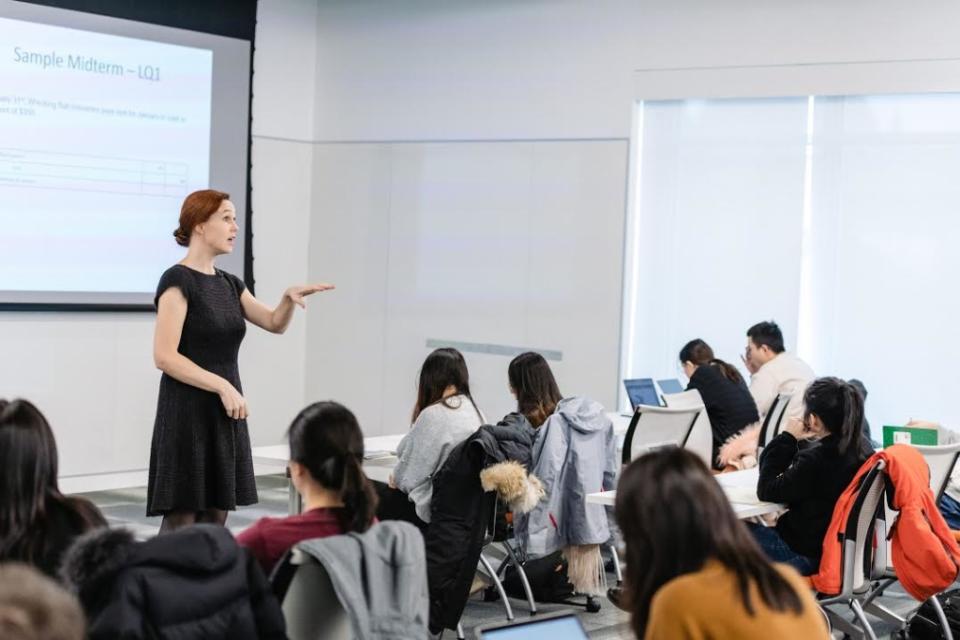Tepper To Launch Full-Time Business Analytics Degree

The Tepper School of Business will offer a new, full-time resident MSBA degree beginning fall 2022. Courtesy photo
The Tepper School of Business at Carnegie Mellon University already offers a part-time, online Master’s of Science in Business Analytics, mostly to mid-career professionals looking to deepen their analytical skills and move into senior positions. The two-year program boasts an 89% success rate of students either earning a promotion or finding a new job by graduation. They also earned an average of 21% more than their previous salaries.
Now, theTepper School is expanding that program for more recent college graduates. It recently announced a new full-time, in-person MSBA that will take nine months to complete. The school is now accepting applications for fall 2022.
“If you’re not yet ready for an MBA, or if you’re interested in an MBA down the road, I think an MSBA positions you very well. It gives you the skills that you can only get from data science as well as the business knowledge to make a real impact in actual business application,” says Willem-Jan van Hoeve, Carnegie Bosch professor of operations research and senior associate dean of education.
DATA SCIENCE + BUSINESS KNOW-HOW
For students looking to work with big data while analyzing complex business problems, Tepper is a top choice. In 2021, Tepper School was ranked No. 2 by U.S. News & World Report for Business Analytics, Information Systems and Production/Operations Management. Meanwhile, demand for data professionals is soaring. The Business-Higher Education Forum predicts that more than 2.7 million jobs are opening to data professionals in the United States, and nearly 40% of data scientist and advanced analyst positions will require an advanced degree.
While the full-time residential degree was developed with more traditional graduate students in mind, mid-career data professionals looking to pivot can also benefit, van Hoeve tells Poets&Quants.
P&Q recently caught up with professor van Hoeve to talk about Tepper’s new full-time MSBA, its four curricular pillars, and why demand for the degree is higher than ever. The interview has been edited for length and clarity. Learn more about the new MSBA here.
Please begin by explaining a bit more about why Tepper created a full-time, in-person MSBA?
We already offer the online MSBA program, which we started a few years ago, and the need since then has only increased for business analytics professionals. GMAC reports that 62% of corporate recruiters plan to hire MSBA graduates in 2021, up from 47% in 2020. We saw similar numbers way back in the day when we started designing the online MSBA as well. So that only corroborates our desire and intent to launch an on-campus version of the program.
How does the curriculum compare for the online and in-person programs?
Our approach to the curriculum is the same as the online MSBA. The target population is slightly different.


Willem-Jan van Hoeve
But it may be good to recognize how we present business analysts and how we prepare our students to become business analytics professionals. On one side of the spectrum you have data sciences, statistics, and so forth. On the other side, you have business professionals. In industry, what you typically find is that people who are trained as data scientists are given a problem that somebody else invents. They work on that problem, they do some analyses and they do some number crunching. On the other hand, there are people who are doing the business side of things, but they don’t necessarily have the acumen or understanding of what goes into the analytics.
What we envision delivering are people who are right in the middle: People who have quite a deep knowledge of the analytic methodologies such as machine learning, operations, research, statistics, optimization and so forth, and they know about data and software engineering, programming, and data visualization to make business cases and actually do some of the analysis themselves. At the same time, they have to translate business applications into data and business analytics problems.
That goes two ways. First, somebody in organizations should identify an opportunity for business analytics, and then match with it the tools and methodologies most suitable for it. Now at that stage, one of our graduates could either do their own implementation, or hand off more detailed questions to another member of the team, possibly an engineer or so forth. Second, once the data is analyzed, the results have to be translated back to the stakeholders. This is critical for success because you can do anything you want with data, but as long as the stakeholders don’t accept your solution, it won’t be implemented.
What we really try to do, from day one, is embed communication, data visualization, while translating that back and forth between business application and the data science behind it. So those are really the four pillars of the program: methodology, software engineering, communication skills, and business application domains.
Was this something recent graduates were asking for, as opposed to the mid-career professionals who were more likely to want an online, part-time program?
The recruiting of students for the online program is clearly different because it is, as you said, typically more experienced people. But, some of them were actually looking for a residential program (when they chose Tepper). This mimics somewhat our online MBA, which is quite successful, as well our hybrid MBA that is highly ranked. It turns out that we actually compete with residential MBA programs in some of our candidates, which is quite interesting. We have seen some candidates for our online MSBA programs that actually considered residential MSBA programs at the same time. This is not, of course, the bulk of the students. But there’s a substantial portion of students that get to know us through our online channels, and they are comparing this to full-time residential programs.
NEXT PAGE: Why corporate recruiters are planning to hire 62% more MSBAs in the coming year.

Entrance to the Tepper School of Business at Carnegie Mellon University. Courtesy photo
Why do you think corporate recruiters are planning to hire more MSBA graduates, as you said earlier, up to 62% more in the coming year?
Well, I think this is still an effect of the rise of big data. I know ‘Big Data’ is a term that’s perhaps a decade old now, but data is even more prevalent now than it was 10 years ago. People describe it as a bubble perhaps, and you might even acknowledge it to be somewhat of a hype, but it doesn’t mean that the hype goes away. The hype becomes establishment.
So I think people still need big data. And the challenge is that the needs of companies have changed as well. For example, companies like Google that rely on data to do targeted advertising, they want to do more and more with data than they already do. Companies like Amazon use it as a critical component of their supply chain optimization, and it’s a critical competitive advantage for them. Anyone who wants to enter an online retail market and wants to compete with Amazon needs these skills. As more and more services are provided online, supply chains have to adapt. So I don’t think there is a trend downwards, and I think the numbers that we see are in line with the expectations that have materialized over the last 10 years.
What are some examples of the big, complex business problems MSBA graduates might be working on?
In our online MSBA, we have a capstone project that people have to do at the end of the curriculum, and we do this with corporate partners. One of them was Tata Consultancy Services who was working with a large package delivery firm to develop improvements to last-mile delivery – a critical component of delivering goods to people in their homes. The bulk of the cost actually comes in the last mile, and any improvements there are super interesting. This is an example of a complex business problem where data is important, quantitative analysis is important, and where a business element is important.
So what is the business problem? Sometimes people get packages delivered to their home multiple times per day by the same delivery agency. This, of course, is inefficiency. Is there a way to consolidate these packages and incentivize people to do that? The team had to formulate opportunities to consolidate deliveries, identify data that might be useful, do a cost analysis, run a simulation, run an optimization of that simulation; and then present a report with very clear guidelines and recommendations on how people can be persuaded to participate.
I think that’s an example of a complex problem that has all these different facets — from analytics to data to optimization methodology to business translation – that an MSBA graduate might be asked to tackle.

A residential class at Carnegie Mellon Tepper School of Business. Courtesy photo.
Are there any differences in the online and in-person MSBA programs besides length and mode of delivery?
It’s still the same curriculum. The only difference is that we have moved the capstone project. For the online folks, the capstone is one semester long. We partitioned that into four different mini experiential learning opportunities for the residential program.
What do you see as advantages of an MSBA in the job market?
Well, I think the most important advantage is, if you’re interested in a career in analytics, an MSBA combines the skills needed for data science with business knowledge. In our online program, we have professionals from all over the spectrum. We have people from Disney, from logistics companies, people who work with supply chains, or in consulting.
I think the MSBA is a great starting point for advancement. Without an MBA, it’s difficult to get into advanced managerial positions. I could imagine that some of the folks that are taking our MSBA program might later want to do an MBA, especially because we’re focusing here on recent graduates, and they’re not yet ready to level up to the broader education an MBA gives you.
What is special about the Tepper MSBA?
I think what’s special is that the faculty teaching this program are full-time faculty, and they are doing cutting-edge research in this area. As you know, Carnegie Mellon is one of the top schools in business analytics, machine learning, optimization, operations research and so forth. Having an opportunity to work with faculty and have contact with faculty that are really doing the research themselves, I think is a fantastic opportunity for students. That’s number one.
Number two, many of us have actually worked with or are working with industry – either through our research projects or as consultants – and we have a fairly good understanding of what is important and how to package it in the best possible way. We designed the curriculum in a very deliberate manner. We did not take courses, say, from the MBA program and just put them together to make this degree. We developed new courses that are very well aligned with one another to get to the outcomes we want.
That’s great. Well, what else didn’t we talk about?
Well, I think it may be good to mention that this is a nine-month program. It’s two semesters, short and sweet, but very intense. This is still Carnegie Mellon; you will have to work hard. But I think that is something that is appealing, especially for people who are coming out of undergraduate studies. They can maybe take off a summer, or do a summer internship, and then start this program and be very well prepared for their future careers.
DON’T MISS: MEET THE MASTERS OF BUSINESS ANALYTICS and MBA CLASS OF 2021 JOBS: DARTMOUTH TUCK MBAS REMAIN IN HIGH DEMAND
The post Tepper To Launch Full-Time Business Analytics Degree appeared first on Poets&Quants.
